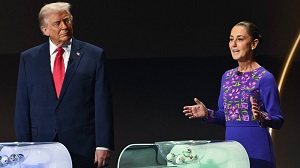For Gen Z, TikTok is the new search engine

New York Times
When Ja’Kobi Moore decided to apply this year to a private high school in her hometown of New Orleans, she learned that she needed at least one letter of recommendation from a teacher. She had never asked for one, so she sought help.
“Teacher letter of recommendation,” she typed into TikTok’s search bar.
Moore, 15, scrolled TikTok’s app until she found two videos: one explaining how to ask teachers for a recommendation letter and the other showing a template for one. Both had been made by teachers and were easier to understand than a Google search result or YouTube video, said Moore, who is planning to talk to her teachers this month.
TikTok is known for its viral dance videos and pop music. But for Generation Z, the video app is increasingly a search engine, too.
More and more young people are using TikTok’s powerful algorithm — which personalizes the videos shown to them based on their interactions with content — to find information uncannily catered to their tastes. That tailoring is coupled with a sense that real people on the app are synthesizing and delivering information, rather than faceless websites.
On TikTok, “you see how the person actually felt about where they ate,” said Nailah Roberts, 25, who uses the app to look for restaurants in Los Angeles, where she lives. A long-winded written review of a restaurant can’t capture its ambience, food and drinks like a bite-size clip can, she said.
TikTok’s rise as a discovery tool is part of a broader transformation in digital search. While Google remains the world’s dominant search engine, people are turning to Amazon to search for products, Instagram to stay updated on trends and Snapchat’s Snap Maps to find local businesses. As the digital world continues growing, the universe of ways to find information in it is expanding.
Ja’Kobi Moore, a 10th grader, in New Orleans on Tuesday, September 13, 2022.
Google has noticed TikTok edging into its domain. While the Silicon Valley company disputed that young people were using TikTok as a replacement for its search engine, at least one Google executive has publicly remarked on the rival video app’s search capabilities.
“In our studies, something like almost 40 percent of young people, when they’re looking for a place for lunch, they don’t go to Google Maps or Search. They go to TikTok or Instagram,” Prabhakar Raghavan, a Google senior vice president, said at a technology conference in July.
Google has incorporated images and videos into its search engine in recent years. Since 2019, some of its search results have featured TikTok videos. In 2020, Google released YouTube Shorts, which shares vertical videos less than a minute long, and started including its content in search results.
TikTok, which is owned by Chinese internet company ByteDance, declined to comment on its search function and products that may be in testing. It said it was “always thinking about new ways to add value to the community and enrich the TikTok experience.”
Doing a search on TikTok is often more interactive than typing in a query on Google. Instead of just slogging through walls of text, Gen Z-ers crowdsource recommendations from TikTok videos to pinpoint what they are looking for, watching video after video to cull the content. Then they verify the veracity of a suggestion based on comments posted in response to the videos.
This mode of searching is rooted in how young people are using TikTok not only to look for products and businesses, but also to ask questions about how to do things and find explanations for what things mean. With videos often less than 60 seconds long, TikTok returns what feels like more relevant answers, many said.
Alexandria Kinsey, 24, a communications and social media coordinator in Arlington, Virginia, uses TikTok for many search queries: recipes to cook, films to watch and nearby happy hours to try. She also turns to it for less typical questions, such as looking up interviews with actor Andrew Garfield and weird conspiracy theories.
TikTok’s results “don’t seem as biased” as Google’s, she said, adding that she often wants “a different opinion” from what ads and websites optimized for Google say.
Kinsey said she also loved how quickly TikTok videos presented information. Although she sometimes fact-checks what she finds on TikTok by using Google, she said, “I rarely see something that requires that much thought.”
TikTok’s ascent as a search engine may mean that more people stumble upon misinformation and disinformation on the app, which could then be amplified and spread further, said Francesca Tripodi, an information and library science professor at the University of North Carolina at Chapel Hill. The platform has struggled with moderating misleading content about elections, the war in Ukraine and abortion.
Alexandria Kinsey, right, with her friend Tayah Barnett, at a sidewalk cafe in Washington on Friday, September 9, 2022. Kinsey uses TikTok to research happy hours in Washington.
TikTok’s algorithm tends to keep people on the app, making it harder for them to turn to additional sources to fact-check searches, Tripodi added.
“You aren’t really clicking to anything that would lead you out of the app,” she said. “That makes it even more challenging to double-check the information you’re getting is correct.”
TikTok has leaned into becoming a venue for finding information. The app is testing a feature that identifies keywords in comments and links to search results for them. In Southeast Asia, it is also testing a feed with local content, so people can find businesses and events near them.
Building out search and location features is likely to further entrench TikTok — already the world’s most downloaded app for those ages 18 to 24, according to Sensor Tower — among young users.
TikTok “is becoming a one-stop shop for content in a way that it wasn’t in its earlier days,” said Lee Rainie, who directs internet and technology research at the Pew Research Center.
That’s certainly true for Jayla Johnson, 22. The Newtown, Pennsylvania, resident estimated that she watches 10 hours of TikTok videos a day and said she had begun using the app as a search engine because it was more convenient than Google and Instagram.
“They know what I want to see,” she said. “It’s less work for me to actually go out of my way to search.”
Johnson, a digital marketer, added that she particularly appreciated TikTok when she and her parents were searching for places to visit and things to do. Her parents often wade through pages of Google search results, she said, while she needs to scroll through only a few short videos.
“God bless,” she said she thinks. “You could have gotten that in seconds.”
Latest News
-
 Netanyahu to Meet Trump on December 29
Netanyahu to Meet Trump on December 29
-
 Hamas says no Gaza truce second phase while Israel 'continues violations'
Hamas says no Gaza truce second phase while Israel 'continues violations'
-
 Trump threatens Mexico with fresh tariffs over water dispute
Trump threatens Mexico with fresh tariffs over water dispute
-
 'Israeli' forces commit 738 ceasefire violations in Gaza in 60 days
'Israeli' forces commit 738 ceasefire violations in Gaza in 60 days
-
 King stresses importance of preserving Christian presence in Middle East
King stresses importance of preserving Christian presence in Middle East